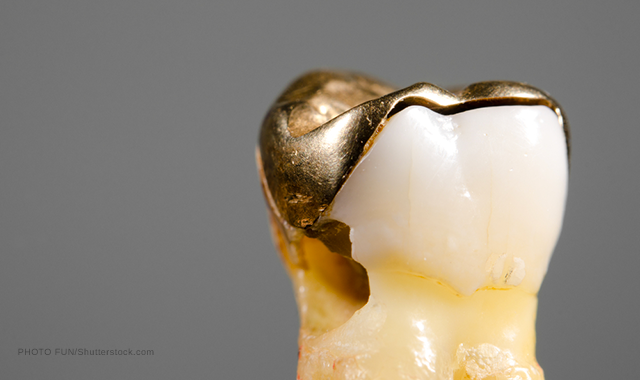New dental fillings could actually REPAIR tooth decay
While dental amalgam has been the most popular dental filling material for a century and a half, new research is introducing an exciting alternative that could actually help repair teeth damaged by caries.

While dental amalgam has been the most popular dental filling material for a century and a half, new research is introducing an exciting alternative that could actually help repair teeth damaged by caries.
Professor Robert Hill, cofounder and director of research at BioMin Technologies and chair of physical sciences at the Institute of Dentistry at Queen Mary University of London, announced that the new composite material could reduce the use of mercury-based amalgams and lengthen the life of composite fillings.
The new composites, made of bioactive glass, help repair tooth decay through the release of fluoride, calcium and phosphate; components that are all key to the formation of tooth mineral. While amalgam fillings are made up of inert materials, the bioactive glass actually replenishes these minerals that were lost due to tooth decay. Additionally, the bioactive glass can prevent oral bacteria from infiltrating the tooth further, by filling in the gaps with tooth mineral.
More emerging research: New study finds way to eliminate pain caused by tooth decay
“Research in the US suggests this will potentially prolong the life of fillings and slow secondary tooth decay because the depth of bacterial penetration with bioactive glass fillings was significantly smaller than for inert fillings,” explains Professor Hill. “Not only did the bioactive glass composite remineralize the partially decayed teeth, but it also creates an alkaline environment that discourages the bacteria that caused the initial decay.
“There is huge pressure to eliminate mercury based amalgam fillings by 2020, which is outlined in a host of international agreements,” says Richard Whatley, CEO of BioMin Technologies. “Using this type of bioactive glass composite to fill cavities eliminates the need to use mercury-based amalgam by offering esthetic white fillings which help heal the tooth."
BioMin Technologies has licensed the new technology from Queen Mary Innovations, with plans to incorporate the remineralizing properties from their BioMinF toothpastes into restorative dental products. “This is a really exciting development which is attracting interest from a number of commercial companies,” states Whatley.
Related reading: New toothpaste can rebuild teeth while you sleep
The toothpaste, available for public distribution, contains the same BioMinF ingredient that is included in the new composite. By releasting calsium, phosphate and fluoride ions over and eight to 12-hour period, the toothpaste can forms fluorapatite minerals to rebuild, strengthen and protect tooth structure. This slow release of fluoride, a key factor of the bioactive glass composites, has been identified as being particularly beneficial in prevention of tooth decay.
According to a dental health survey conducted in the United Kingdom, 90 percent of adults and two-thirds of young adults ages 16-24 in the UK has at least one filling. On average, adults had seven fillings, with 84 percent of all filled teeth restored with dental amalgam. Across the ocean in the United States, the average American has three dental fillings, with a quarter of the population having 11 or more fillings.
Amalgam, made up a mixture of silver, mercury, tin and other metals, has recently been found to contribute to higher mercury levels in patients’ blood, making finding an alternative to traditional amalgam fillings increasingly important. High levels of mercury can be toxic, and can cause brain, heart, lung and immune system issues, among other concerns. One recent study found that patients with more than eight fillings had approximately 150 percent more mercury in their blood than individuals who had no fillings.
Episode 31: Dentsply Sirona Implant Announcements
September 30th 2021DPR’s Editorial Director Noah Levine sat down with Gene Dorff, Dentsply Sirona’s group vice president of implants and Dr. Dan Butterman to review several big announcements the company made in the arena of implants during Dentsply Sirona World 2021 in Las Vegas.